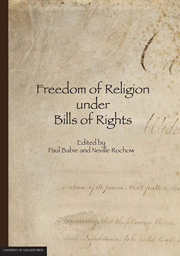Book contents
- Frontmatter
- Contents
- Acknowledgments
- List of Contributors
- Foreword by The Hon Sir Anthony Mason AC KBE: Human Rights and Courts
- INTRODUCTION
- SETTING THE SCENE
- CONTEMPORARY FREEDOM OF RELIGION ISSUES
- COMPARATIVE EXPERIENCE WITH FREEDOM OF RELIGION
- 9 Political Culture and Freedom of Conscience: A Case Study of Austria
- 10 The Sky is Falling if Judges Decide Religious Controversies! – Or is it? The German Experience of Religious Freedom Under a Bill of Rights
- 11 Religious Freedom in a Secular Society: The Case of the Islamic Headscarf in France
- 12 Religious Freedom in the UK after the Human Rights Act 1998
- 13 Judicial Interpretation, Neutrality and the US Bill of Rights
- 14 Protecting Religious Freedom: Two Counterintuitive Dialectics in US Free Exercise Jurisprudence
- 15 Walking the Tightrope: The Struggle of Canadian Courts to Define Freedom of Religion under the Canadian Charter of Rights and Freedoms
- 16 Quo Vadis The Free Exercise of Religion? The Diminishment of Student Religious Expression in US Public Schools
- 17 Freedom from Discrimination on the Basis of Religion
- 18 Ruminations from the Shaky Isles on Religious Freedom in the Bill of Rights Era
- 19 Indigenous Peoples and Bills of Rights
- TABLE OF LEGISLATION AND INTERNATIONAL INSTRUMENTS
- INDEX
13 - Judicial Interpretation, Neutrality and the US Bill of Rights
from COMPARATIVE EXPERIENCE WITH FREEDOM OF RELIGION
Published online by Cambridge University Press: 05 June 2013
- Frontmatter
- Contents
- Acknowledgments
- List of Contributors
- Foreword by The Hon Sir Anthony Mason AC KBE: Human Rights and Courts
- INTRODUCTION
- SETTING THE SCENE
- CONTEMPORARY FREEDOM OF RELIGION ISSUES
- COMPARATIVE EXPERIENCE WITH FREEDOM OF RELIGION
- 9 Political Culture and Freedom of Conscience: A Case Study of Austria
- 10 The Sky is Falling if Judges Decide Religious Controversies! – Or is it? The German Experience of Religious Freedom Under a Bill of Rights
- 11 Religious Freedom in a Secular Society: The Case of the Islamic Headscarf in France
- 12 Religious Freedom in the UK after the Human Rights Act 1998
- 13 Judicial Interpretation, Neutrality and the US Bill of Rights
- 14 Protecting Religious Freedom: Two Counterintuitive Dialectics in US Free Exercise Jurisprudence
- 15 Walking the Tightrope: The Struggle of Canadian Courts to Define Freedom of Religion under the Canadian Charter of Rights and Freedoms
- 16 Quo Vadis The Free Exercise of Religion? The Diminishment of Student Religious Expression in US Public Schools
- 17 Freedom from Discrimination on the Basis of Religion
- 18 Ruminations from the Shaky Isles on Religious Freedom in the Bill of Rights Era
- 19 Indigenous Peoples and Bills of Rights
- TABLE OF LEGISLATION AND INTERNATIONAL INSTRUMENTS
- INDEX
Summary
Neutrality, whether formal or substantive, does not exist in the context of the religion clauses in the United States Constitution. Others have recognized this. Still others have come part way to this conclusion by suggesting that neutrality is inherently dependant upon the baseline one chooses to use in describing it, and thus it does not exist apart from these baselines. Yet claims of neutrality cannot be proven. There is no independent neutral truth or baseline to which they can be tethered. This is important because it means that any baseline to which we attach neutrality is not neutral, and claims of neutrality built on these baselines are by their nature not neutral. This might seem circular — that is, since there is no independent state of neutrality from which to derive neutral rules or applications of rules, there can be no neutral results and no means by which one can prove a given baseline is neutral. Yet examples, even in US Supreme Court opinions, are readily available. The Court has used varying concepts or baselines of neutrality, and in several cases Justices in the majority and dissenting opinions claimed to be relying on the same or similar principles of neutrality, yet they reached opposite conclusions.
This critique of neutrality applies to both the recent Court's use of formal neutrality (a concept explained further below) and to earlier Courts' substantive neutrality or separation as neutrality approaches (also explained further below). This chapter pays much attention to the concept of formal neutrality that seems most pervasive today, at least in cases involving aid to religious entities or individuals, equal access, and free exercise clause exemptions. As will be seen, the critique of neutrality provided herein applies to any claim that a given approach is ‘neutral’ in regard to the many highly contested questions arising when government and religion interact in our complex regulatory state. In the end, as with interpretive claims based on hard originalism, neutrality requires value choices that are often masked under the cloak of evenhandedness or other mostly rhetorical devices.
- Type
- Chapter
- Information
- Freedom of Religion under Bills of Rights , pp. 253 - 284Publisher: The University of Adelaide PressPrint publication year: 2012



